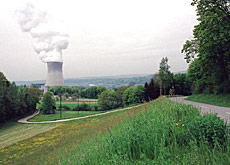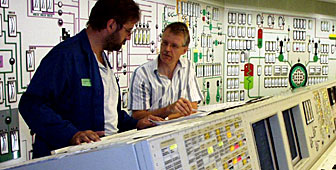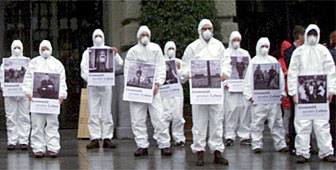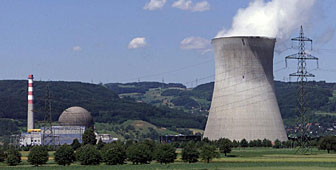Swiss nuclear stations certified terrorism-proof

Switzerland's nuclear power plants are well protected against a highjack terrorist attack, according to a government study.
A sweeping review of the country’s four nuclear sites, launched after the attacks of September 11, says the risk of radioactive contamination following a plane crash is minimal.
The Federal Nuclear Inspectorate, which conducted the study, ranked Switzerland’s power plants among the safest in the world.
“The findings were very positive,” Ulrich Schmocker, the Inspectorate’s director, told swissinfo.
“Safety is much higher than we previously thought, based on so-called conservative analysis.”
Schmocker said Switzerland’s two newest plants, in Gösgen and Leibstadt, had “complete protection” against an airplane crash. In the older plants, in Beznau and Mühleberg, the protection was high, with only a small potential for radioactive material being released.
Foolproof
The findings, which come ahead of a nationwide vote on nuclear energy, were compiled from theoretical tests and from the results of simulated plane crashes into buildings.
The Inspectorate said it took into account variables such as the different types of aircraft, their maximum speed and the amount of fuel they carried in order to come up with a foolproof verdict.
The study focused on the main nuclear reactor buildings, which are potentially the most destructive.
“We were only concerned with the reactor building, because if that survives [we can avoid nuclear contamination] and from there, it’s possible to shut down the entire plant,” Schmocker explained.
He added that other buildings nearby would very probably be damaged.
The main reason for the positive safety result was the protective design of Switzerland’s nuclear reactor sites, whose walls are made up of several metres of solid steel and concrete, he said.
Schmocker added that, in any case, the relatively small size of a nuclear reactor building would make it almost impossible for a plane to hit it with any accuracy.
Narrow focus
However, Leo Scherer of Greenpeace, criticised the narrow focus of the study.
“They’ve failed to look at the other ways in which terrorists could attack a nuclear plant,” Scherer told swissinfo. “What about if a plane is filled with explosives or if there are missiles?”
“The only real safety measure is to shut them down.”
The Inspectorate rebuffed the criticism, explaining that its safety reviews were ongoing and that it was impossible to predict the kinds of attacks that terrorists might launch.
It also denied that the study had been timed to coincide with two votes on nuclear energy on May 18, when the Swiss electorate will have to decide whether to shut down the country’s nuclear plants and, in a separate vote, to extend a moratorium on building new plants.
“The question of sabotage of a nuclear plant could be an argument in the coming vote,” Beat Wieland, head of the Department for Nuclear Energy, admitted. “But the timing was coincidental.”
swissinfo, Vanessa Mock
A government study into Switzerland’s nuclear power plants says they rank among the safest in the world.
The risk of radioactive contamination in case of a plane being driven into the main nuclear reactor was “null” at the two newest plants, and “low” at two older plants.
The study was launched after the attacks of September 11; it comes ahead of a nationwide vote on nuclear energy in May.

In compliance with the JTI standards
More: SWI swissinfo.ch certified by the Journalism Trust Initiative




You can find an overview of ongoing debates with our journalists here. Please join us!
If you want to start a conversation about a topic raised in this article or want to report factual errors, email us at english@swissinfo.ch.